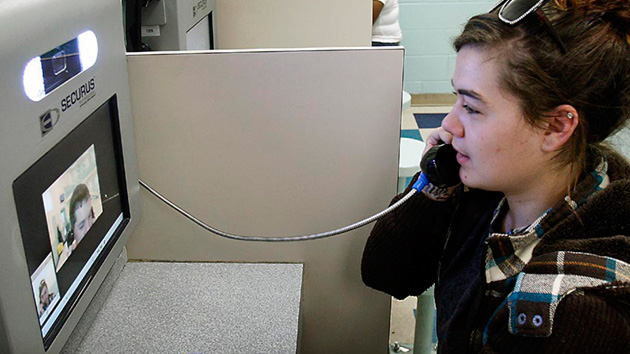
<a href="http://www.shutterstock.com/cat.mhtml?lang=en&language=en&ref_site=photo&search_source=search_form&version=llv1&anyorall=all&safesearch=1&use_local_boost=1&search_tracking_id=cGvx3S2EuZrFOaqDDsmcBg&searchterm=prison%20visit&show_color_wheel=1&orient=&commercial_ok=&media_type=images&search_cat=&searchtermx=&photographer_name=&people_gender=&people_age=&people_ethnicity=&people_number=&color=&page=1&inline=187651811">TAGSTOCK1</a>/Shutterstock
Video visitation is the hot new trend in the corrections industry. Companies like Securus and Global Tel*Link, which have made big bucks charging high prices for inmate phone services, are increasingly pitching county jails new systems that will allow inmates to video-chat with friends and family. Using new terminals installed onsite, inmates can communicate with approved users who log in remotely on a special app similar to Skype. For inmates whose loved ones don’t live anywhere near their corrections facility, that can be good news.
But as I reported for the magazine in February, those video-conferencing systems sometimes come with a catch—jails that use the systems are often contractually obligated to eliminate free face-to-face visits, leaving family members no choice but to pay a dollar-a-minute for an often unreliable service.
In a press release last week Securus has announced it will no longer require jails to ditch in-person visitation:
“Securus examined our contract language for video visitation and found that in ‘a handful’ of cases we were writing in language that could be perceived as restricting onsite and/or person-to-person contact at the facilities that we serve,” said Richard A. (“Rick”) Smith, Chief Executive Officer of Securus Technologies, Inc. “So we are eliminating that language and 100% deferring to the rules that each facility has for video use by inmates.”
Translation: Nothing to see here, move along! But while inmates might be getting their face-to-face visitation back, Securus’ concession on in-person visits comes even as it’s fighting the Federal Communication Commission’s efforts to regulate the cost of intrastate prison phone calls (it capped the price of interstate prison phone calls in 2014 at 25 cents per minute). And the corrections technology industry isn’t the only group defending the status quo—the executive director of the National Sheriffs’ Association told IB Times earlier this month that if the FCC interferes with phone prices (corrections facilities often get a cut of the profits), some jails may just decide to cut off access to phone calls.















